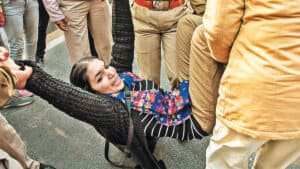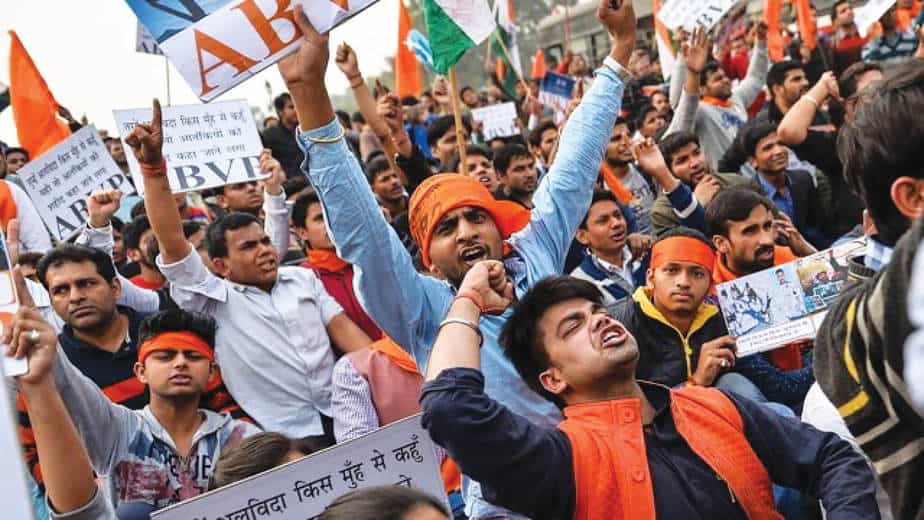Whether it is Delhi University or JNU, the unrest widely reported in the media is discouraging students from making Capital campuses their first choice
Incident 1: Najeeb Ahmed, a first-year student of Jawaharlal Nehru University, went missing after a brawl with members of the Akhil Bharatiya Vidyarthi Parishad (ABVP) at Mahi-Mandavi Hostel in Delhi on October 2016. Students have taken to staging demonstrations in the Capital ever since his disappearance. The Delhi High Court has transferred the investigation of the case to the CBI. The High Court disagreed with the allegations of the student’s family that the investigation in the case was “politically motivated” and lacked “integrity”.
Incident 2: In 2017, the English Department of Ramjas College, Delhi University, and Wordcraft — the college’s literary society — held a seminar titled ‘Cultures of Protest: A Seminar Exploring Representations of Dissent’. However, on the day planned for intellectual debates and academic altercations, the college witnessed intense violence involving students from the Delhi University Students’ Union and the Akhil Bharatiya Vidhyarthi Parishad (ABVP), the student wing of the BJP. They violently attacked professors, students and other attendees of the event.
The conference was first disrupted by the members of the ABVP, who brought lathis with them. This was followed by stone pelting and more physical attacks on the attendees of the seminar. ABVP members and supporters objected to the seminar on the grounds that its line-up of speakers included Jawaharlal Nehru University student Umar Khalid – a PhD scholar who was arrested on charges of sedition in February 2016. Khalid, who is working on a dissertation focusing on tribal communities was invited to speak. Following opposition to the event, the organisers met with Rajendra Prasad, the then principal of Ramjas. They decided to withdraw the invitation to Khalid.

Incident 3: Nivedita Menon, a JNU professor, was targeted for being anti-national and now almost every university has stopped inviting her, although she used to be a popular face earlier.
These are not just regular incidents of violence on campus that have no impact. These are some of the incidents that are hugely influencing fresh entrants who wants to pursue higher studies after college.
There are questions raised by many sections of the society: Is this violence being created by design?
“My daughter is good in studies and she was very keen to join one of the prime colleges in Delhi. She has secured around 98 per cent marks in higher secondary; probably she could have had a dream college life here in the capital. But growing incidents of violence have created doubts in my mind. So much so that I explained it to her. She tried in Bengaluru and I preferred it in place of Delhi,” says 53-year-old LIC officer from Lucknow Jayanta Parmanik.
Parmanik has just completed the formalities of putting her daughter into a reputed college of Karnataka. Parmanik is not alone. There are many such parents who would want to change destinations or want their children to go for alternative careers.
“We read news about violence on college campus almost every day once the session begins. I just feel what would happen if after a difference of opinion or a difference in ideology go missing? How would my parents deal with it? They would run around without any knowledge. I am putting in application forms but with a fearful mind. I have no idea whether this is a deliberate attempt to create doubts in minds or not but I am confident it is influencing many minds,” says Adityakant, a Ryan International student who cleared his senior secondary school this year and is filling up applications for admission in Delhi University.

A university is an arena for the battle of ideas. Experts feel that there is a need for a different kind of battle in all university campuses and specifically in the colleges of Delhi University.
“Universities are like breeding ground of ideas for young and fresh minds. They think beyond. Any violence and intimidation negates the very idea of the university and there is no cause large enough to justify them — not subaltern classes nor oppressed castes or, as in this case, aggrieved patriots. The university cannot afford to accommodate violence precisely because it is meant to be an arena for the battle of ideas. And in this sense the university is indeed a privileged space set apart from the everyday world”, says Professor Amit Ranjan who teaches at St. Stephen’s College while commenting on the consistent incidents of police intervention and violence in the campus.
The University of Delhi has received as many as 2,21,309 application forms after ending the online application process of 2017-18 admissions. The total number of DU 2017 application forms received in 2017-18 this year is a notch lower than that of around 2.5 lakhs recorded last year.
The university claimed that the reduction in numbers could be because duplicate applications were not accepted. “Duplicate applications were rejected last year. And that appeared to be the reason for a lower turnout of application forms. We are waiting this year and would conclude after the admission procedure as what are the reasons if it turns out low again this year”, shared a DU Official.
Speaking about the rising incidents of violence in the campus, Harish Wankhade, Assistant Professor of Political Science in Jawaharlal Nehru University(JNU) said, “The trend is not showing good signs for sure. There is something that needs to be corrected. Parents are coming out in support of agitating students, students joining their teachers in their struggle. A fresh mind will certainly try to do add up to all the incidents, inaction or action by the administration and authorities which could be negative or positive. Unfortunately, the thought process is witnessing negative thinking which is not good for society”.





